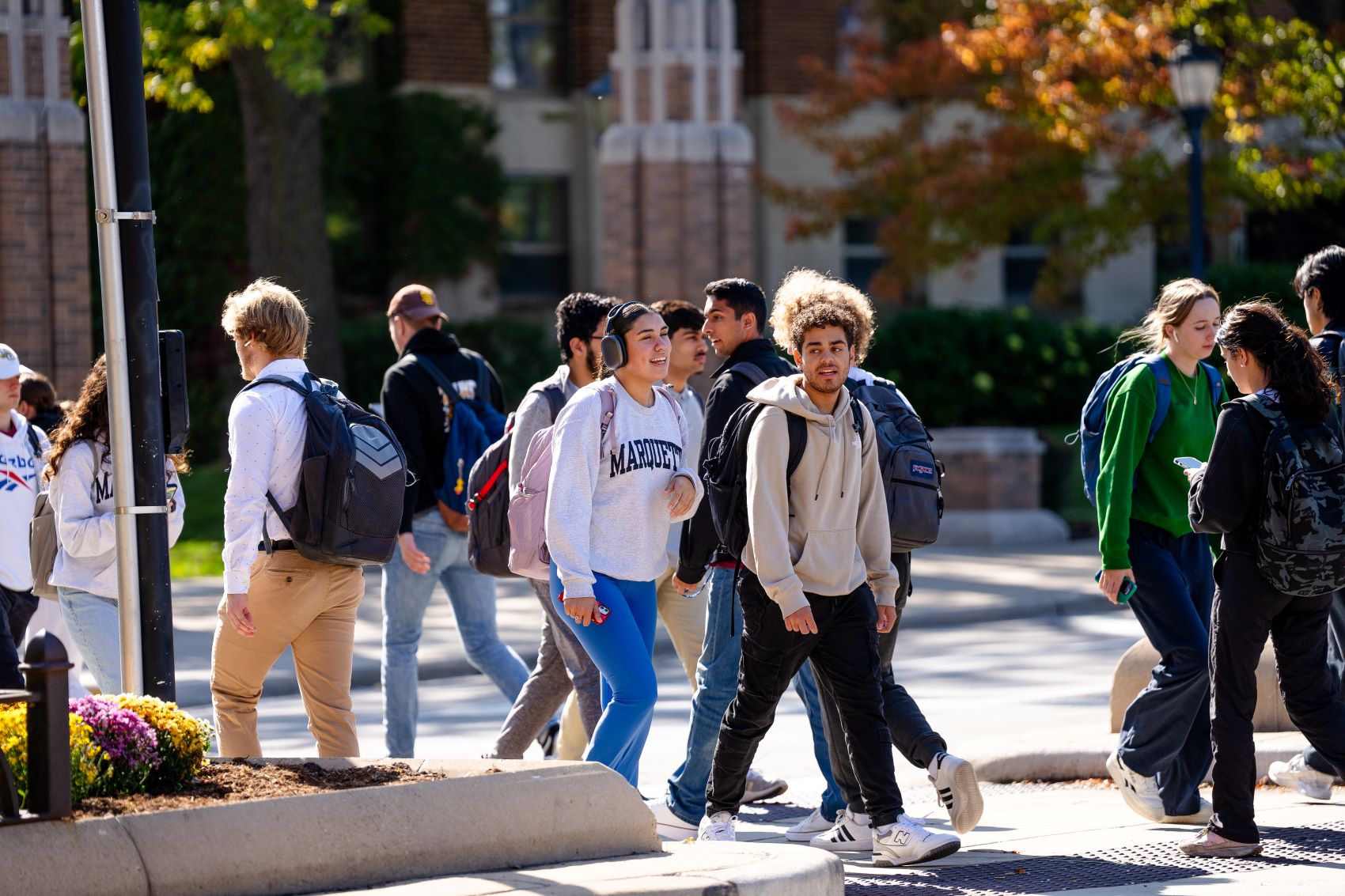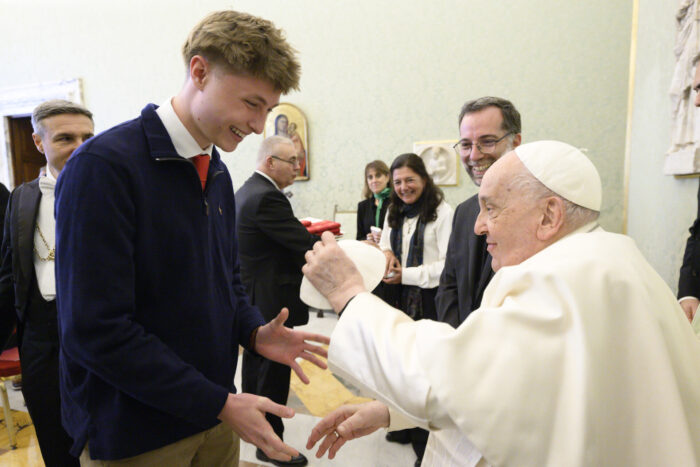Marquette University, recognized by The Princeton Review as one of the nation’s most environmentally responsible colleges, is committed to sustainability and environmental justice.
Following are some of the ways Marquette is working toward its sustainability goals.
Marquette University highlighted in the 2023 Sustainable Campus Index
Marquette was highlighted in a new Trends & Innovations section of the 2023 Sustainable Campus Index, a publication that shares campus sustainability initiatives as identified through AASHE Bulletin news stories and recent AASHE STARS reports. Marquette was recognized for its collegiate participation in the WAVE program.
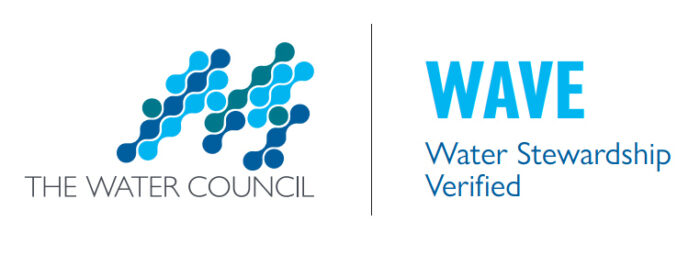
Marquette participates in The Water Council’s WAVE program
Marquette recently announced its commitment to The Water Council’s WAVE program for improving, reporting and recognizing good water stewardship by institutions. Marquette President Michael R. Lovell made the announcement at the Sustainability 2.0 Conference; Marquette is the first college or university to participate in the program.
The Water Council’s WAVE program is a six-step methodology that gives companies a way to improve their water stewardship and, importantly, have it independently verified. Through this process, companies demonstrate that they are strategically prioritizing water-related action where it matters most. This leads to more meaningful water-related goals, targets and outcomes.
Read more about Marquette and its participation in the Water Council’s WAVE program.
Launch of the Laudato Si action task force
In response to Pope Francis’ encyclical Laudato Si’ on “care for our common home” and the Vatican’s Laudato Si’ Action Platform, President Michael R. Lovell announced at his annual address in January the formation of a campuswide Laudato Si’ Action Plan Task Force to be led by Lora Strigens, vice president for facilities and planning; and Chelsea Malacara, campus sustainability coordinator. The task force looks to expand upon the university’s recent sustainability efforts and help create a deeper culture of sustainability across campus.
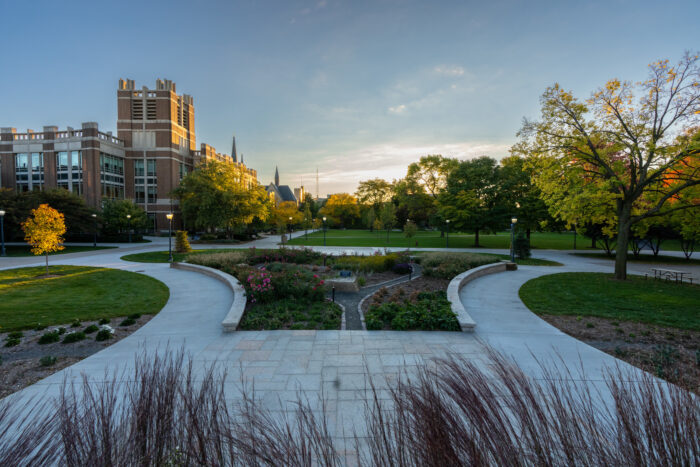
Bronze rating for comprehensive sustainability achievements
Marquette has received a STARS Bronze rating in recognition of its sustainability achievements from the Association for the Advancement of Sustainability in Higher Education.
The STARS program is a self-reporting rating system which looks at 500 data points to assess an organization’s progress in five overall areas: academics, engagement, operations, planning and administration, and innovation and leadership.
The STARS rating acknowledges Marquette’s comprehensive efforts to improve sustainability and reduce the university’s carbon footprint. Such improvements — led primarily by Facilities Planning and Management — align with one of the Society of Jesus’ Universal Apostolic Preferences, “To collaborate in the care of our Common Home,” and Pope Francis’ encyclical Laudato Si’.
Read more about Marquette’s bronze rating for sustainability achievements.
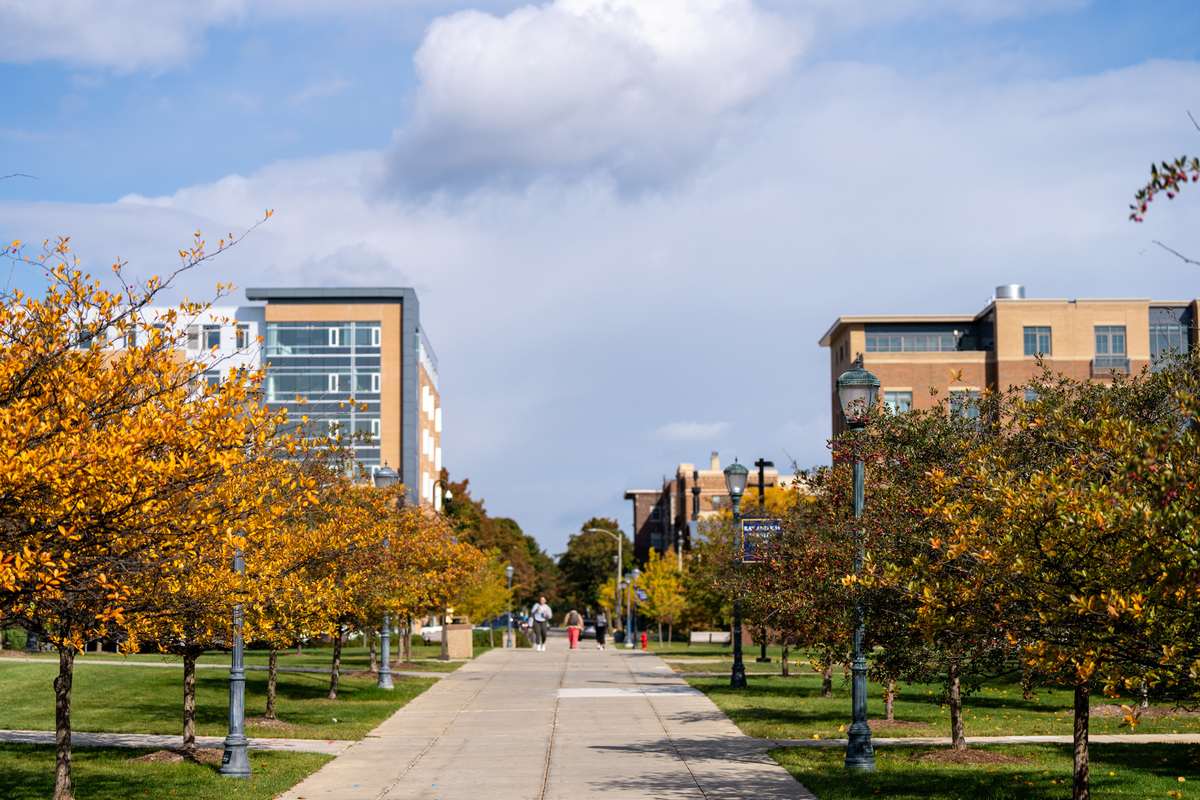
Marquette updates endowment policy to prohibit direct investments in fossil fuels
Marquette University’s Board of Trustees has approved an updated investment policy for the university endowment with new socially responsible investing and sustainability language that strictly prohibits direct investments in public securities whose primary business is the exploration or extraction of fossil fuels. The university’s current investment portfolio does not include any direct public investments in fossil fuels.
Read more about Marquette’s updated endowment policy prohibiting direct investment in fossil fuels.
Identifying native trees on Marquette’s campus
Marquette University has a high concentration of Wisconsin-native trees on its campus, and that’s why Facilities Planning and Management began taking inventory of Wisconsin-native trees with the goal of creating an interactive geographic information system map that the community could use to locate and learn more about the native trees. The map is now live on the DNR site which is linked to Marquette’s sustainability site. The university has catalogued 1,468 trees but continues to add more as they update the inventory.
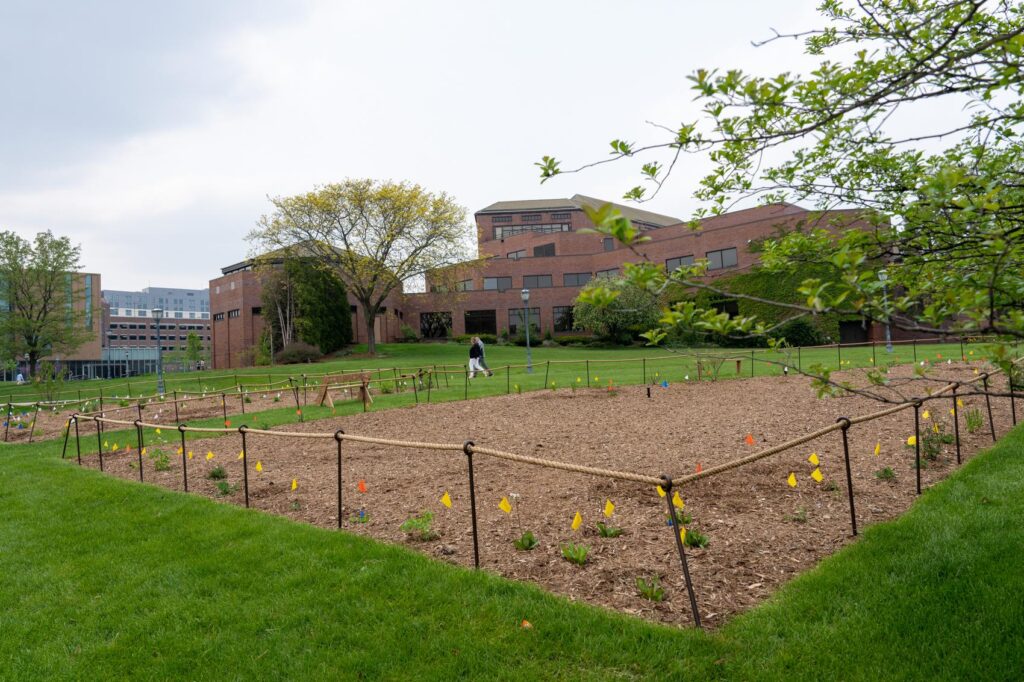
Pocket Prairie initiative
The Pocket Prairies are two sections of land on Eckstein Common with around 35 native Wisconsin plants, including wildflowers, grasses and shrubs. Go Wild, the campus organization behind the Pocket Prairies initiative, allows Marquette to participate in federal and state initiatives to restore pollinator habitats, as well as provide several other benefits to the campus ecosystem.
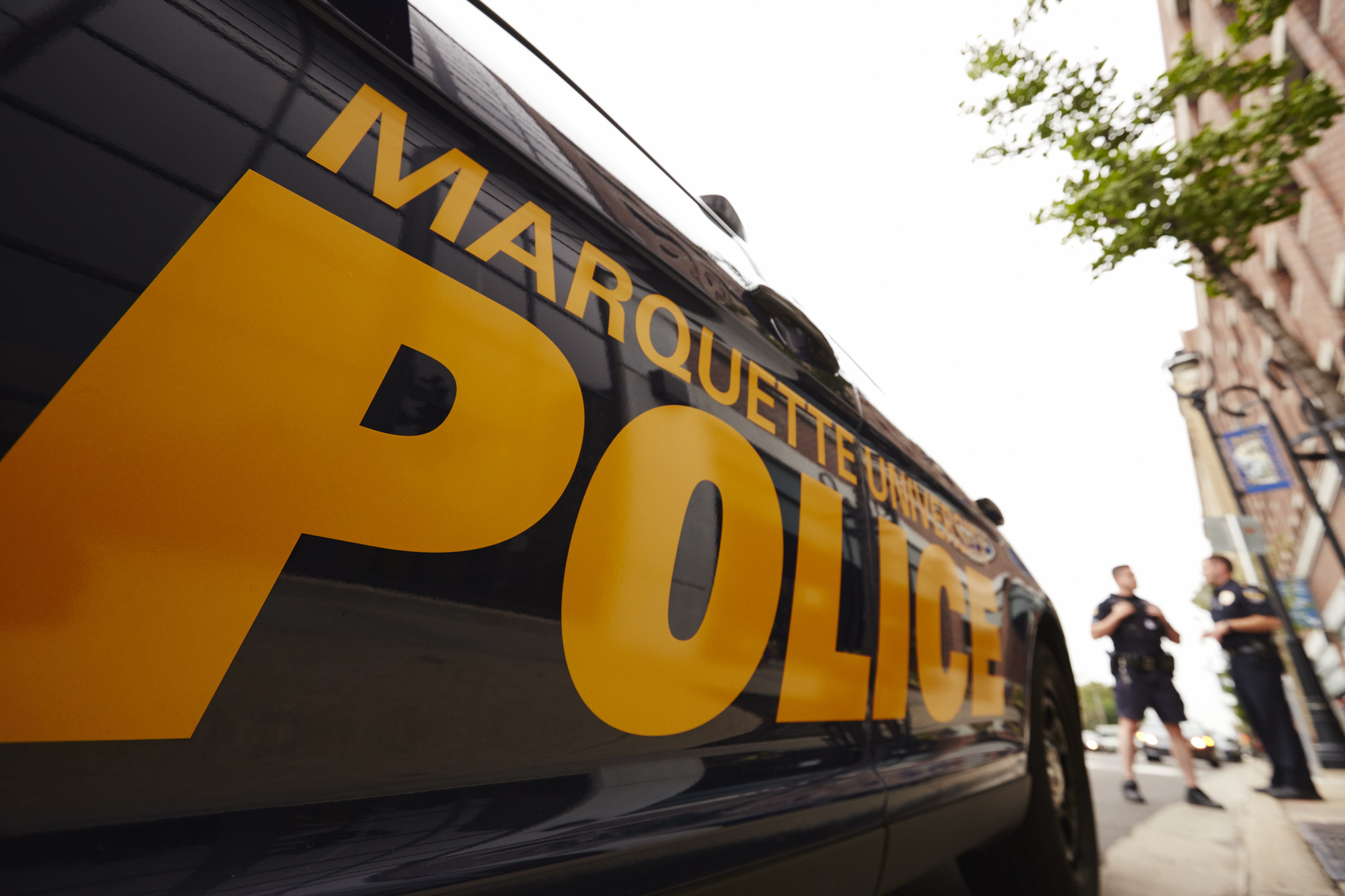
MUPD moving to hybrid squad cars
Marquette University Police Department has begun its transition to hybrid vehicles, deploying its first two hybrid squad cars at the start of the spring semester. The move is the first step in transitioning the department’s entire fleet to hybrid vehicles.
Read more about MUPD’s hybrid squad cars.
Developing careers in sustainability management, sustainable investing
Marquette University has partnered with the Sustainability Accounting Standards Board and the CFA Institute to offer a four-module, non-credit program to prepare business leaders for a career in sustainability management and investing.
Program participants will emerge with the skills required to fill positions in sustainability management, product development, sustainable accounting or Environmental, Social and Governance (ESG) investing. Upon completion, students can be certified in both the Fundamentals of Sustainability Accounting and ESG Investing, the two leading global certifications.
Instructor Dr. Christopher Merker says that learning these skills is critical to employers as firms across all sectors seek to make sustainability a foundational part of their business model.
Read more about Marquette’s partnership with the Sustainability Accounting Standards Board.
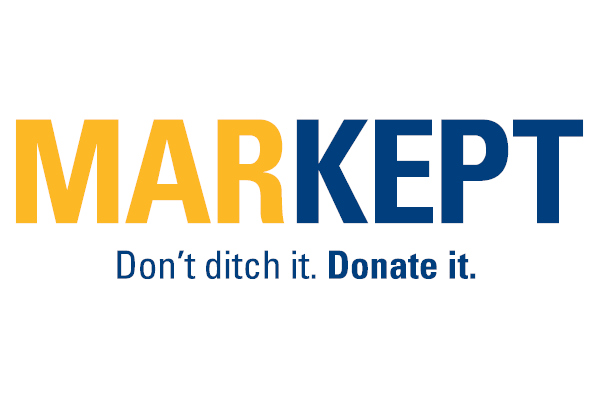
MarKept Move Out
Each year, move-out activities generate a significant amount of waste that ends up in our landfills, causing further environmental degradation. MarKept Move Out is designed to be a part of the solution by giving new life to gently used good that end up in Marquette’s dumpsters — and ultimately in Wisconsin landfills — at the end of the year by creating a system that makes it easier for students to donate these items. Donated items will subsequently be sold at an on-site yard sale during student move-in at a drastically reduced price.
Iggy’s Market
Iggy’s Market is part of MarKept Move-out and move-in initiative that promotes circular economies and supports college affordability. The program is a way for students to purchase good-conditioned, used items that were headed toward a landfill during move-out. Prices range from free to $40, with the average item costing $2.50.
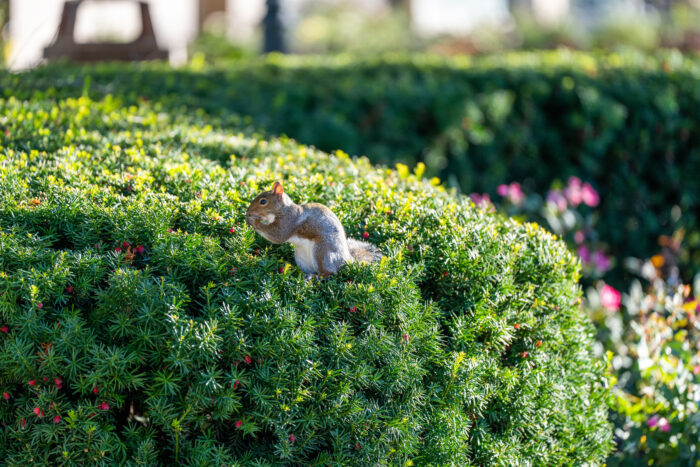
Green spaces on campus are place for wildlife refuge
Throughout Marquette’s campus, there are beautiful green spaces and gardens used for places of peace for students — and even native wildlife.
For example, the Gratitude Garden outside St. Joan of Arc Chapel offers natural space for birds, bees, bunnies and other wildlife, alongside growing plants.
By providing these gardens and reducing pesticide use throughout campus, Marquette offers pollinators enough food, nest materials and nesting locations to thrive in an urban environment.
Read more about the green spaces and refuge places for wildlife throughout Marquette’s campus.
Graduate student researches honeybee behavior
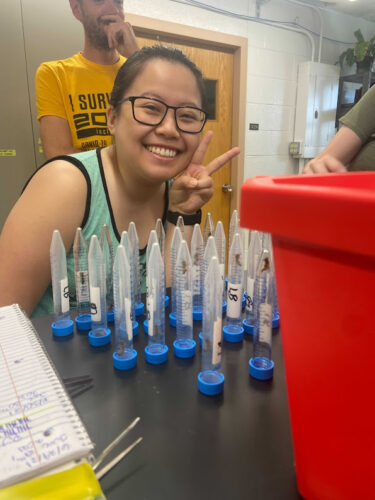
Justine Nguyen, a graduate student studying microbiology in the Klingler College of Arts and Sciences, was long averse to bugs of all sorts—particularly bees. Then she met Dr. Chelsea Cook, associate professor of biological sciences, when she went to work in Cook’s lab. There, the two explored physiology, neurobiology and the environment to help understand emergent collective behavior of honeybees—a deeply threatened insect population.
Through the research, they uncovered something counterintuitive to them: giving bees antibiotics actually affected their behavior in positive ways. Cook and Nguyen are now building on that finding to ultimately help bees thrive.
Read more about Justine Nguyen and her research in Cook’s honeybee lab.
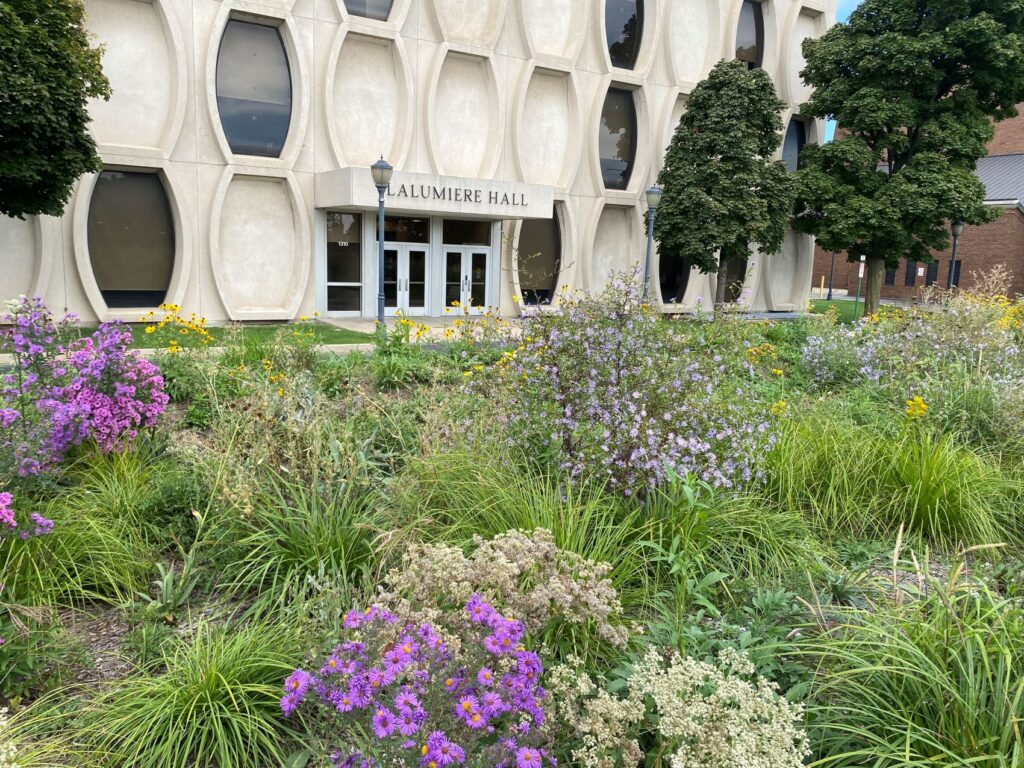
Two new green infrastructure projects on campus
Marquette University has partnered with the Milwaukee Metropolitan Sewerage District in constructing two new stormwater runoff mitigation projects.
Between the two new projects, Marquette has the potential to prevent up to nearly 500,000 gallons of stormwater runoff during a single rain event.
The two new green infrastructure projects are located at Parking Lot T near the School of Dentistry and a bioretention area will be installed just north of West Clybourn Street on Lalumiere’s south lawn.
Read more about the green infrastructure projects on campus.

Clearer skies by way of hybrid and electric engines for aircraft
One Marquette University professor is leading the way to continue research on hybrid and electric engines for aircraft.
Dr. Ayman EL-Refaie, Thomas and Suzanna M. Werner Endowed Chair in Secure and Renewable Energy Systems and professor of electrical and computer engineering in the Opus College of Engineering, received a $5 million Department of Energy grant to continue researching and develop the next generation of electric and hybrid engines.
With hybrid and electric engines, the aircraft gets more power, but also leads to a significant reduction in fuel consumption and emissions.
Read more about EL-Refaie’s efforts to bring hybrid and electric engines to the sky.
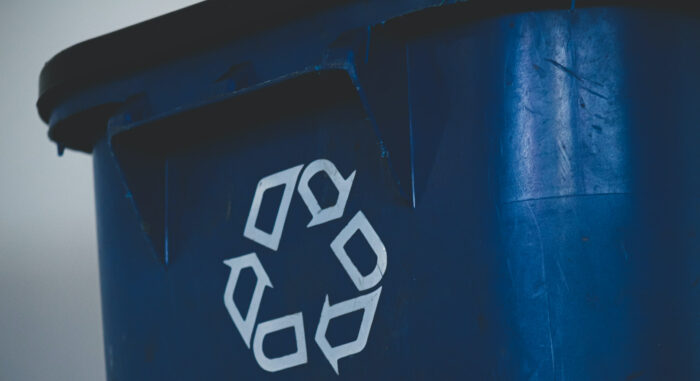
Take sustainability into your own hands
From using LED lightbulbs to recycling your pizza boxes, there are a handful of ways Marquette students can be the difference and make sustainable choices.
Students can make the switch to reusable, eco-friendly water bottles, go fully digital for all academic uses, or even use cold water when doing laundry, and many more to reduce their carbon footprint and be more sustainable while studying at Marquette.
Read more about the six ways to be more sustainable at Marquette.
Related content:
